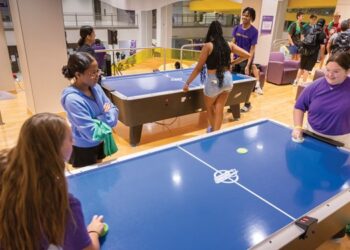Retention is important in campus recreation — you’ve driven a student through your doors, so obviously you want to keep them coming back. This can prove more challenging than you might think, considering classes, friends and sleep are already competing for a college student’s time.
Knowing there are a variety of reasons any student can fall through the cracks in rec center participation, University Recreation (UREC) at the University of Arkansas employs several strategies across campus throughout each semester to engage students and improve retention.
“We are engaging with students through traditional and non-traditional programming, ambassador programs, advisory councils, actively soliciting input from them, engaging social media posts and creating relationships with student employees,” said Jeremy Battjes, the assistant dean and UREC director at Arkansas.
What works best for the UREC team is using student employees as the first point of contact for all participants, especially when gathering feedback. This principle led Arkansas to its latest retention strategy.
“In Fall 2018, our marketing team will have launched a ‘street team,’” said Battjes. “This will be a team of students who will be actively promoting UREC by working their way across the campus and engaging with the student body.”
Engaging the student body for the “street team” could involve giving out promotional materials on campus, simply talking with students about what they want to see from the UREC programs and facilities, or any other creative method they’re able to dream up. Any way they can help keep participation numbers high on campus is encouraged.
According to Battjes, the team’s greatest advantage will be their ability to relate to other students. “We’re optimistic this group will be able to connect to the current student body and promote active participation in UREC facilities and programs,” he said.

Your student staff is critical in sharing the importance of rec programs on campus — it could be a difference-maker for students who think they don’t have the time to stick with rec center activities. “Our student employees are our best and most reliable connection to the campus population,” said Battjes. “The students relate to one another and speak the same language.”
The idea of students “speaking the same language” that pro staff members don’t speak might sound a bit farfetched, but your students are much more likely to give honest feedback about campus rec programming to fellow students. The idea of preferring “peer-to-peer” conversations exists everywhere, even in the professional world.
These interactions also don’t have to be about what they want or what could be better. Students are often much more enthusiastic about rec programs when they know other students are having positive experiences with them. “Students begin sharing their experiences with each other, which leads to additional students using your facilities and services,” said Battjes.
It will also lead to a higher percentage of your students staying involved at your rec center. The bottom line is your students want to be involved in something they feel they can relate to.
Students don’t just want a place to workout — they want an organization that aligns with their goals, beliefs and values. Having your student staff actively engage with your student participants will help affirm how much you can help them develop during their college years.
In fact, creating relationships between student staff and student participants could end up being your best retention strategy. “Students can become natural ambassadors for you, spreading your brand and generating interest in your programs on campus,” said Battjes.










